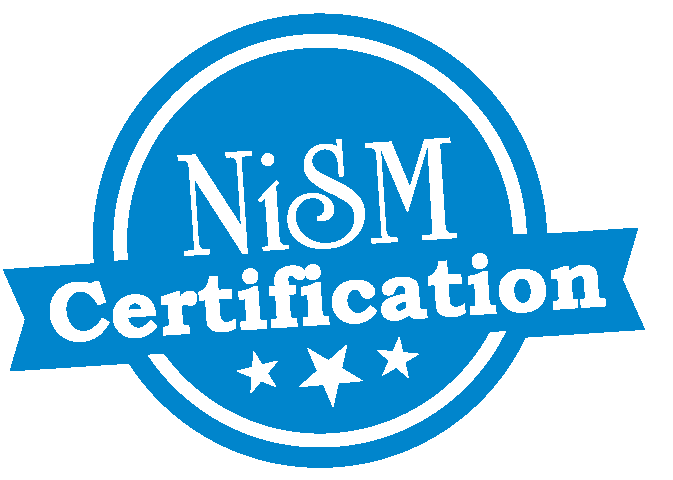Best Institute for NISM/NCFM Exam Preparation Course in India
100% Customized Program for advance career development in the field of financial planning
Be a Professional Financial Planner
for further query
contact us
NISM CERTIFICATION
Best Certifications for Financial & Securities Markets in India (Powered by National Institute of Securities Market)
Currency Derivatives Certification Examination
NISM Series I
knowledge benchmark for persons working in the Currency Derivatives market segment, in order to enable a better understanding of currency markets and exchange traded currency future products, better quality investor service, operational process efficiency and risk controls.
Introduction to Currency Markets
- History of foreign exchange markets
- Major currency pairs
- Overview of international currency markets
- Basics and Peculiarities of currency markets in India
- Settlement or value date
- Over-the-Counter (OTC) forward market
- Exchange rate arithmetic- cross rate
- Impact of market economics on currency prices
- Economic indicators
Foreign Exchange Derivatives
- Evolution of derivatives
- Derivative products and features
- Growth drivers of derivatives
- Market players in the foreign exchange market
- Key economic functions of derivatives
- Exchange-Traded Vs. OTC derivatives
Strategies Using Currency Futures
- Role of speculation in futures markets
- Long position in futures
- Short position in futures
- Hedging using currency futures
- Types of hedgers
- Size of the hedging position
- Trading spreads using currency futures
- Concept of arbitrage
- Use of arbitrage in currency futures markets
- Arbitrage opportunities under various conditions
Clearing, Settlement and Risk Management in Currency Futures
- Clearing entities
- Clearing mechanism
- Open positions and obligations of clearing members
- Settlement mechanism – MTM settlement & Final settlement
- Risk management measures
- Concept of margin requirements
- Initial margin
- Portfolio based margin
- Calendar spread margin
- Extreme loss margin
- Liquid net worth
- Liquid assets
- Real time computation
- Process of margin collection by Clearing Corporations
Exchange Traded Currency Options
- Options
- Call and put option
- Bought and sold option
- Option premium
- Futures and options
- European vs. American option
- Moneyness of an option
- Option pricing and option Greeks
- Option pricing methodology – Black-Scholes model & Binomial pricing model
- Option pay offs
- Option strategies
- Practical application of currency options
- Clearing, settlement and risk management for currency options
- Initial margin
- Extreme loss margin
- Net option value
- Calendar margin
Codes of Conduct and Investor Protection Measures
- Features of SEBI Codes of Conduct for brokers
- Features of SEBI Codes of Conduct for sub-Brokers
- Features of Codes of Conduct specific to Exchange Traded Currency Derivatives Segment
- Grievance redressal mechanism for investors
- Nature of complaints considered by exchanges
- Arbitration mechanism at exchanges

NISM-Series-V-A:
Mutual Fund Distributors Certification Examination
The certification aims to enhance the quality of sales, distribution and related support services in the mutual fund industry.
Concept and Role of a Mutual Fund
A. Concept of a mutual fund
B. Functions of a mutual fund
C. Advantages and limitations of a mutual fund
D. Investment objectives
E. Marking to market
F. Unit capital
G. Assets under management (AUM)
H. Fund running expenses
I. Net asset value (NAV)
J. Brief history of mutual funds in India
K. Closed end funds and open ended funds
L. Categorization of funds by investment objective
M. Categorization of funds by investing horizon
N. Categorization of funds by asset class
O. International funds
P. Fund of Funds
Q. Exchange Traded Funds (ETF)
Fund Structure and Constituents
A. Structure of mutual funds in India and related regulations
B. Role of the sponsor, trustee and Asset Management Company (AMC) and related regulations
C. Role of other fund constituents and related regulations
Legal and Regulatory Environment
A. Role of regulators in India
B. Role and functions of SEBI in regulating mutual funds
C. Self regulatory organizations
D. Role and functions of AMFI
E. AMFI Code of Ethics
F. Investment restrictions and related regulations
G. Investor rights and obligations
Fund Distribution and Sales Practices
A. Types of investors and eligibility
B. Distribution channels for mutual funds
C. Pre-requisites to become a mutual fund distributor
D. Key elements of agreement between distributor and a mutual fund
E. Sales practices and commission structure
F. Types of commissions and transaction charges
G. AMFI Code of Conduct
H. Process for KYD
Investor Services
A. KYC requirements & Demat Account concept
B. Process for fresh and additional purchase in a mutual fund
C. Additional documentation requirements for institutional investors
D. Acceptable payment instruments
E. Processes related to redemptions by investors
F. Contents and periodicity of Statement of account
G. Process for Nomination and Pledge
H. Types of Investment options – dividend, growth and dividend re-investment
I. Processes related to of systematic investment plans
J. Processes related to systematic withdrawals and transfers
K. Processes related to other investor services and facilities
Helping Investors with Financial Planning
A. Basics of financial planning
B. Financial goals
C. Investment horizon
D. Objective of financial planning
E. Benefits and need for financial planning to the investor
F. Life cycle and wealth cycle in financial planning
G. Tools to categorize investors’ needs
Recommending Model Portfolios and Financial Plans
A. Risk profiling
B. Asset allocation and types
C. Importance and steps for developing a model portfolio

NISM-Series-V-C:
Mutual Fund Distributors Certification Examination
Certification enable a better understanding of features of advanced mutual fund products, fund valuation, fund performance measurements, investor service and related regulations.
Mutual Fund Structures
A. Fund of Funds
B. Exchange Traded Funds
C. Real Estate Mutual Funds
D. Venture Capital Funds
E. Private Equity Funds
F. International funds
Legal and Regulatory Environment of Mutual Funds
A. Regulatory Framework for Real Estate Mutual Funds
B. Investment Norms for Mutual Funds
C. SEBI Norms for Mutual Funds’ investment in Derivatives
D. SEBI norms with respect to change in controlling interest of an AMC
E. Changes in Mutual Fund Schemes
Investment and Risk Management
A. Fundamental Analysis
B. Technical Analysis
C. Quantitative Analysis
D. Debt Investment Management
E. Issues for a Debt Fund Manager
F. Derivatives
G. Application of Derivatives
Valuation of Schemes
A. Equities
B. Debt
C. Non-Performing Assets and Provisioning for NPAs
D. Gold
E. Real Estate
Accounting
A. Net Asset Value
B. Investor Transactions
C. Distributable Reserves
D. Unique Aspects of Real Estate Schemes Accounting
Taxation
A. Taxes for AMCs: Securities Transaction Tax and Income Distribution Tax
B. Taxes for Investors: Securities Transaction Tax, Taxes on Dividend, Capital Gains, Set-off and Carry Forward of Losses, Dividend Stripping and Bonus Stripping.
Investor Services
A. New Fund Offer
B. Open-end Fund
C. Closed-end Fund
D. Exchange Traded Fund
E. Nomination and Pledge
Scheme Evaluation
A. Measures of Return
B. Measures of Risk
C. Benchmarks and Relative Returns
D. Risk-adjusted Returns
E. Limitations of Quantitative Evaluation
Asset Classes and Alternate Investment Products
A. Historical Returns
B. Perspectives on Asset Class Returns
C. Alternative Investment Products
Ethics and Investor Protection
A. Code of Conduct
B. Mis-selling
C. Safeguards in Mutual Fund Structure
D. Regulatory Steps for Protecting Investors Against Fraud

NISM-Series-VI :
Depository Operations Certification Examination
Create a common minimum knowledge benchmark for associated persons engaged or employed by a registered depository participant
Introduction to the Capital Market
A. Introduction to the capital market
B. Structure of capital market
C. Regulatory environment in Indian capital market
D. Regulators in the Indian capital market
Introduction to Depository
A. Need for a depository system
B. Depository as a market participant
C. Legal framework in which the depositories function in India
D. Functions of a depository
Depository and its Business Partners
A. Depository participants (DPs)
B. Clearing corporation/Clearing house
C. Issuers and RTAs
Functions of Depository Participant -Account Opening
A. Types of demat account a person can open with a DP
B. Beneficiary account
C. Clearing member account
D. Closure of account
E. Freezing of account
F. Procedure and documentation for changes in client details
Functions of Depository Participant – Transmission and Nomination
A. Transmission of shares
B. Nomination of shares
C. Process of transmission of securities held with or without nomination and jointly
Functions of Depository Participant -Dematerialization
A. International Securities Identification Number (ISIN)
B. Process of dematerialization
C. Process of rematerialisation
Functions of Depository Participant -Trading and Settlement
A. Role of DP in facilitating the transfer of securities
B. Off-Market transactions
C. Market transactions
D. Inter-Depository transfers
Pledge and Hypothecation
A. Concept of pledge and hypothecation
B. Procedure for pledge and hypothecation
Corporate Action
A. Corporate Actions
B. Procedure for Corporate Action w.r.t monetary benefits
C. Procedure for Corporate Action w.r.t non-monetary benefits
D. Procedure for Corporate Action w.r.t rights issue
E. Procedure for Corporate Action w.r.t mergers and amalgamations
F. Procedure for Corporate Action w.r.t monetary benefits
G. Procedure for Corporate Action w.r.t interest payment on debt securities
Public Issues
A. Role of DP in the process of public issues
Debt Instruments and Government Securities
A. Debt instruments and government securities
B. Certificate of deposit (CDs)
C. Commercial paper
D. Government securities
Foreign Portfolio Investor
A. Eligibility Criteria of Foreign Portfolio Investors (FPI)
B. Categories of FPI
C. Eligibility Criteria and Engagement of Designated Depository Participant (DPP)
Rajiv Gandhi Equity Saving Schemes
A. Procedure for opening an account to invest in RGESS
Basic Services Demat Account (BSDA)
A. Features of BSDA
B. Eligibility conditions required for opening BSDA

NISM-Series-VII : Securities Operations and Risk Management Certification Examination
Certification create a common minimum knowledge benchmark as the requisite standard for associated persons of a registered stock-broker / trading member / clearing member in recognized stock exchanges, involved in assets or funds of investor or clients , redressal of investor grievances,internal control or risk management and activities having a bearing on operational risk.
Functions of Depository Participant – Transmission and Nomination
A. Transmission of shares
B. Nomination of shares
C. Process of transmission of securities held with or without nomination and jointly
Functions of Depository Participant -Dematerialization
A. International Securities Identification Number (ISIN)
B. Process of dematerialization
C. Process of rematerialisation
Functions of Depository Participant -Trading and Settlement
A. Role of DP in facilitating the transfer of securities
B. Off-Market transactions
C. Market transactions
D. Inter-Depository transfers
Other Services Provided by Brokers
A. Services provided by brokers
B. IPO applications
• Collection of IPO application forms
• ASBA facility
C. Mutual fund trading through stock exchange
D. Portfolio management services provided by brokers
E. Research reports
F. Depository services
G. Margin trading

NISM-Series-VIII:
Equity Derivatives Certification Examination
Certification aims to enable a better understanding of various derivatives products available in equity derivatives markets, regulations and risks associated with the products and the exchange mechanisms of clearing and settlement.
Understanding Index
- Introduction to Index
- Significance and economic purpose of Index
- Types of Indices
- Attributes of an Index and concept of impact cost
- Index management
- Major Indices in India
- Applications of Index
Sales Practices and Investors Protection Services
- Risk profile of the investors.
- Importance of profiling clients in sales process
- Importance of KYC
- Documents required by the investors to trade in Derivatives contract
- Best practices in derivatives sales
- Investors Grievance Mechanism

NISM-Series-XV:
Research Analyst Certification Examination
Research Analyst Certification create a common minimum knowledge benchmark for all associated persons registered as research analyst under SEBI (Research Analyst) Regulations, 2014, individuals employed as research analyst and partners of a research analyst, engaged in preparation and/or publication of research report or research analysis
Introduction to Research Analyst Profession
A. Understand the Primary role of a Research Analyst
B. Know the Primary responsibilities of a Research Analyst
C. Know the Basic principles of interaction with Companies / Clients
D. Understand the Important qualities of a Research Analyst
Introduction to Securities Market
A. Know about “Securities” and “Securities Market”
B. Understand Product Definitions / Terminology
C. Know the Structure of Securities Market
D. Know Various market participants and their activities
E. Learn about the Kinds of transactions
F. Know about Dematerialization and Rematerialization of securities
Terminology in Equity and Debt Markets
A. Know about the Terminology in Equity Market
B. Know about the Terminology in Debt Market
C. Understand the Types of Bonds
Industry Analysis
A. Understand Dr. Michael Porter’s five force model for industry analysis
B. Understand Political, Economic, Socio-cultural, Technological, Legal and Environmental (PESTLE) Analysis
C. Understand Boston Consulting Group (BCG) Analysis
D. Understand Structure Conduct Performance (SCP) Analysis
E. Know the Key Industry Drivers
F. Understand the Regulatory environment/framework
G. Know about the Sources of information for industry analysis
Company Analysis – Qualitative Dimensions
A. Understand Business and Business Models
B. Know the Competitive Advantages/Points of differentiation over the competitors
C. Understand Strengths, Weaknesses, Opportunities and Threats (SWOT) Analysis
D. Know about Quality of management (including independent directors) and governance
E. Understand Pricing power and sustainability of this power
F. Know about the Organization structure
G. Understand Critical business drivers/success factors
H. Know about the Risks in the business
I. Understand Compliance orientation of the company
J. Know about the Documentation on Guidance v/s Actuals
K. Know about the Sources of information for analysis
Corporate Actions
A. Understand the philosophy of corporate action
Sales Practices and Investors Protection Services
- Risk profile of the investors.
- Importance of profiling clients in sales process
- Importance of KYC
- Documents required by the investors to trade in Derivatives contract
- Best practices in derivatives sales
- Investors Grievance Mechanism
Fundamentals of Risk and Return
A. Understand the Concept of return of investment and return on investment
B. Know the Calculation of simple, annualized and compounded returns
C. Learn about the Risks in investments
D. Know the Concepts of market risk (Beta)
E. Understand Sensitivity analysis to assumptions
F. Know the Concept of Margin of Safety
G. Know the Comparison of equity returns with bond returns
H. Know the Basic Behavioral Biases influencing investments
I. Know about some pearls of wisdom from Investment Gurus across the world

certification partners

NSE's Certification in Financial Markets
NSE's Certification in Financial Markets promotes financial literacy as a necessary life skill. Our NSE Academy Certification in Financial Markets, or NCFM, program is an online testing and certification program that tests the practical knowledge and skills required to operate in the financial markets. The NCFM program operates on our intranet and is administered through our designated test centers located across India.

NISM Certification
National Institute of Securities Market (NISM) is engaged in developing certification examinations for professionals employed in various segments of the Indian securities markets. These examinations are being developed by NISM as mandated under SEBI. The NISM Certifications Portal is a a centralized portal for access to all information related to NISM Certification Examinations as well as Continuing Professional Education (CPE). The portal also provides educational content to educate and help professionals entering the securities markets.
why us ?
We are keep close working with industry needs & customized our program

Live Interships
To create corporate ready students we manage to provide internship with stipend and also provide certain industry certifications by professional bodies .

Placement Assistance
We constantly connect with the industry people and many recruiters to provide best advantage to the Finance students.

Industry Expert Faculty
Faculty in Financial Certification Course require Industry Experts which also provide industry insights and current trend and changes in the wealth management or Financial Planning Industry.
